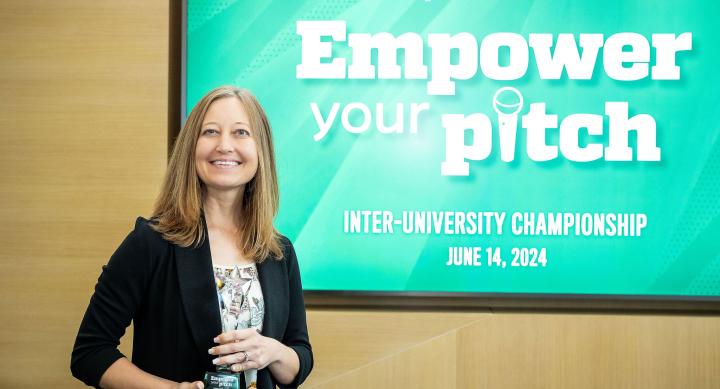
Brandy Routh, a fourth-year Neuroscience Ph.D. candidate, was named as one of three winners of the 2024 inter-university Empower Your Pitch competition held at the Johns Hopkins University in Baltimore on June 14, 2024. This year's event marked the first intercollegiate contest and featured participants from Johns Hopkins, Columbia University and The University of Texas at Austin.
An invigorating re-design of the 3-Minute Thesis format, Empower Your Pitch is a dynamic public speaking competition and skill-development series designed to equip participants with the strategies needed to effectively communicate complex ideas in just three minutes. UT Austin held its campus-wide competition in April where the judges named three winners, along with a people’s choice winner. Winners received a cash prize and a trip to Baltimore to compete in the inter-university competition with students from Johns Hopkins and Columbia.
The inter-university contest awarded three prizes in the following categories: overall excellence in research communication; outstanding creativity in research communication; and outstanding public engagement through research communication. Winners received a $1,000 award in recognition of their accomplishment.
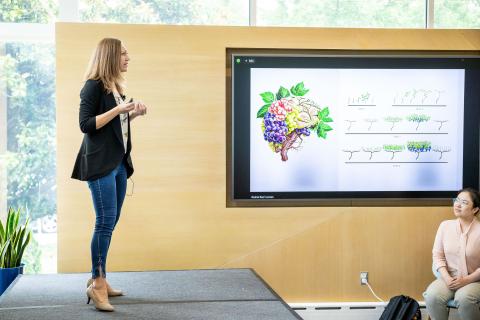
Routh’s presentation, “Circadian Rhythms Shape the Growing Brain,” was selected for its overall excellence in research communication. Her research explores the intersection between circadian rhythms and brain health where she aims to learn how circadian disruptions (like irregular wake/sleep cycles) can alter the brain's immune system and contribute to psychiatric illness across sensitive life stages, such as child development, pregnancy and aging.
Her presentation highlighted how brain development is analogous to a growing garden, which requires both watering and pruning for balanced growth. Routh explains how, in childhood, the back and forth of daily light/dark rhythms helps the brain balance the watering and the pruning, but disrupting the brain's clock can shift this balance, physically altering brain connections.
Brandy Routh took time this summer to answer questions about her award-winning research presentation and her experience participating in the intercollegiate Empower Your Pitch competition.
Please elaborate on the goal of your research. How would you explain your research methodology to a non-specialist audience? Has your research led to any trends or specific findings?
We all know that getting a good night’s sleep is important for our overall health and wellbeing. However, most people aren’t aware that, beyond the obvious cycles of waking and sleeping, the rest of our bodily functions also follow a daily rhythm, influencing everything from when we learn best, exercise best, or even when we’re most at risk for skin cancer. These “circadian” rhythms are written into our genetic code, our genes directing the activities of almost every cell of our bodies according to a 24-hr period. How do circadian “clock genes” and the physiological rhythms they produce influence our brains? And since sleep disruption is a common symptom across several neurological disorders, how might circadian disruptions be negatively impacting neurological health?
I’m particularly interested in phases of life where the brain may be especially vulnerable to circadian irregularities, such as early in development or in aging. To study the brain across various life stages, I work with mice—sometimes young mice, sometimes pregnant mice, sometimes old mice. Regardless of the study aims, there are ways to use genetic or environmental manipulations to interfere with their circadian rhythms. Then I use a combination of animal behavioral tests, immune cell isolation techniques, RNA sequencing, or neuronal electrical recordings to test how the brain is affected by these disrupted rhythms. I work with such a variety of techniques that on any given week my work can look completely different than the weeks before!
While my dissertation work is still unfolding, the trend is that, yes, circadian rhythms really do impact brain function and animal behavior in almost every place we look! The work I presented for EYP studies how clock genes influence the brain’s immune system during development. I’m also working on a few other stories: one related to circadian disruption in new mothers, and another one focused on circadian dysregulation with aging and Alzheimer’s Disease. With every experimental finding, I’m newly amazed by the strong influence that circadian rhythms have over neurological health.
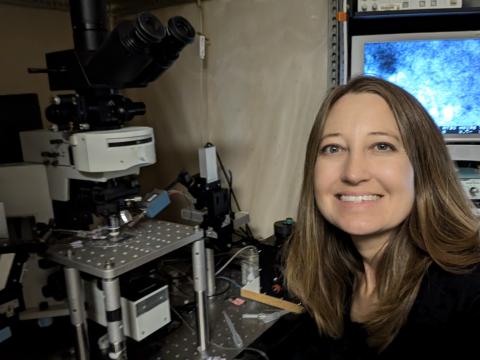
What drew you to neuroscience and your specific strand of research around brain health?
I’ve always been interested in mental health, and the biological processes that underlie our emotional experience of the world around us. The fact that the physiology and biochemistry of our brains can so potently affect our daily lives is both fascinating and humbling. Why do some people struggle with mental health while others don’t? And importantly, how can we find new and better ways to empower individuals who are trapped in depression or anxiety to find a path forward? Or to prevent them from experiencing these problems in the first place?
These questions have always driven me towards neuroscience, but circadian rhythms weren’t on my radar until in my first semester of grad school, in the Neuropharmacology class that I had NOT wanted to take (but registered for because it best fit my schedule). In one of the first lectures, my now-mentor, Dr. Laura Fonken, introduced me to the far-reaching impacts of the circadian system, and instantly I began wondering how this could intersect with the mental health questions I’ve always had. My specific area of research then combined my long-standing interest in psychological health, with this newfound fascination with the complex circadian system.
Have you encountered any significant challenges in your research? If so, what were they and how are you working to overcome them?
The nature of my research means that many of my experiments must be carried out at specific times of the day, which has made much of my work fairly time-inflexible. Adding a developmental question to this mix, where a day or two can make a big difference to the growing brain, and I often end up with inconvenient timings for my experiments. Getting to the lab at 4am or coming (back) at 9pm. Or working over weekends. This erratic schedule has been especially difficult for the rest of my family, since I’m a parent with school-age children who have their own school or extracurricular schedules. Because of this, I’m always having to think strategically about experimental timing and how to accomplish my aims while simultaneously maintaining work-life balance. This experience has pushed me to grow in the areas of strategic planning and project management, embracing an unconventional work schedule in order to get it all done.
What inspired you to participate in the Empower Your Pitch competition and what was your preparation process like?
When I heard about EYP, I thought it sounded interesting, but I wasn’t sure I had the time to prepare for it. However, my mentor encouraged all her grad students to participate, so I signed up at the very last minute. In the end, I figured I would at least learn something from EYP, even if I didn’t make it to the final rounds. My preparation process in the first round was honestly very rushed, but the judges and my fellow contestants gave me very thoughtful, helpful feedback in that round, which helped me refine my talk. That first round also opened my eyes to the diverse research areas across the entire campus, from law to engineering to public health. Witnessing the other presentations on topics that were completely foreign to me helped me to experience what it’s like to be a non-specialist and to consider how to communicate my research more for individuals outside of my own field. Over the weeks, I continued implementing feedback and learning from the other presenters.
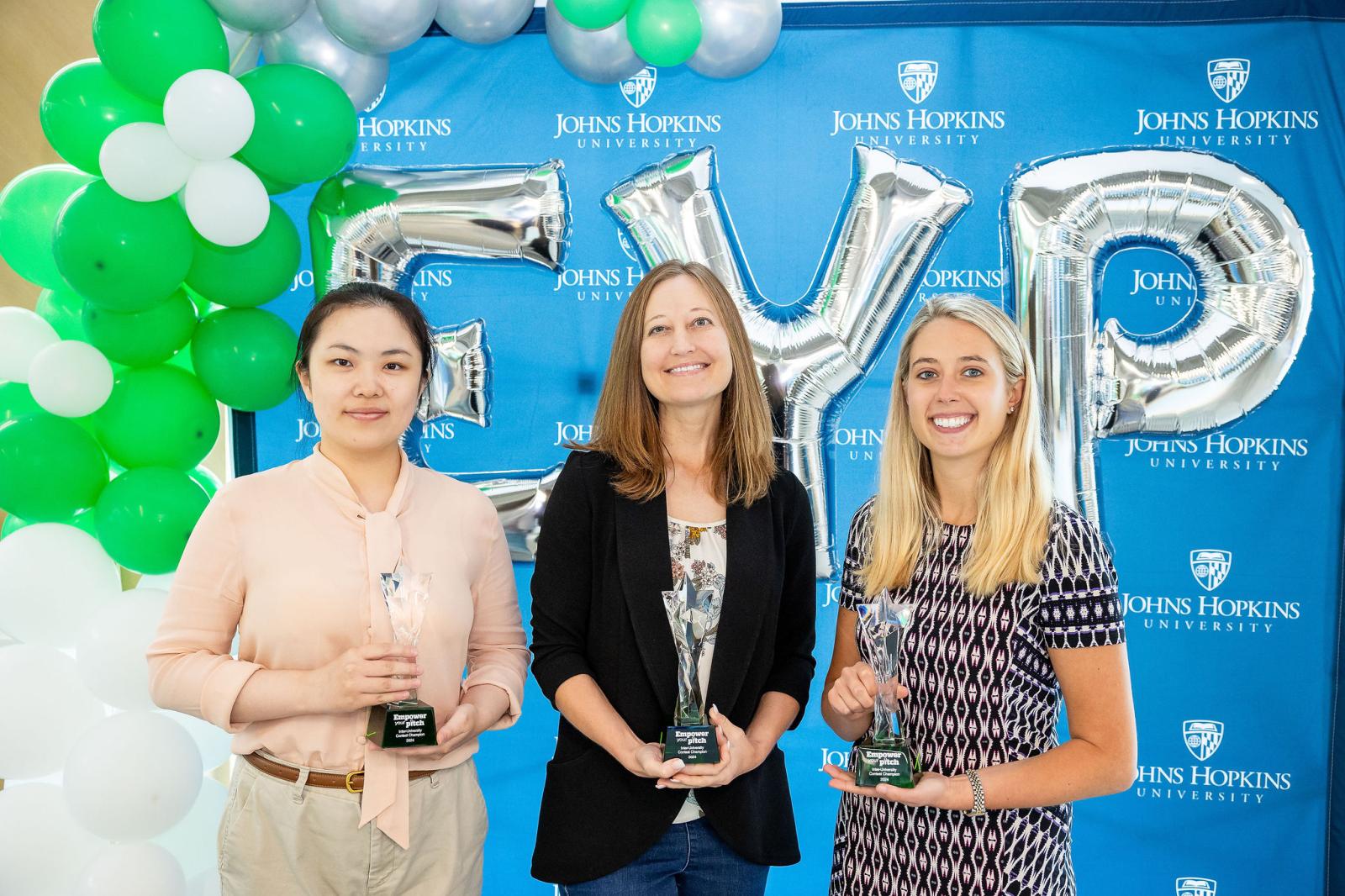
As you know, the EYP competition offers resources to participants as they prepare their presentations? Did you take advantage of any of the training opportunities before the competition? If so, were they helpful?
I wasn’t aware of these opportunities before the competition, since I didn’t know what to expect at all! However, once I joined EYP, I gained so much from the personal feedback and from watching the other competitors. The positive environment combined with personalized recommendations week-to-week really improved my presentation.
What was one of your favorite memories from your trip to Baltimore?
Probably the crab! The night I arrived in Baltimore, our Johns Hopkins hosts treated us to dinner at a local seafood restaurant, complete with a short crab-shelling lesson. I had never disassembled a crab in my life, so it was a brand-new experience for me! The meat was tasty, and the experience was novel, but I’m okay if I never shell another crab in my lifetime!
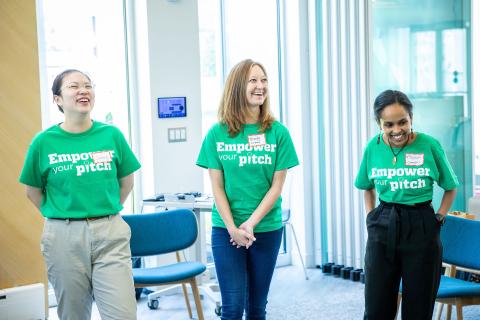
I also really enjoyed the Improv Workshop we participated in immediately before the final competition. This was another first for me! I appreciated our workshop leader, how he encouraged us to accept mistakes as a natural part of trying to communicate with others, and how he used humor to push us towards being better listeners and better collaborators. The “yes… and” strategies we practiced changed my perspective on scientific collaboration and have helped me grow in active listening and building upon other people’s ideas instead of critically shutting them down.
Did participating in the EYP competition impact your larger body of research in any significant way? If so, how?
EYP helped me to see the value of sharing my work outside of my field. I was surprised how often people would come up to me and share how my presentation made them reconsider their own circadian habits! My non-specialist audience also brought their own unique perspectives and further questions that have allowed me to think more critically about how to build on my work to make it more impactful in the future. I saw how much benefit all of us gain from greater research communication, and I’m now eager to share more and hear more creative questions and ideas from others!